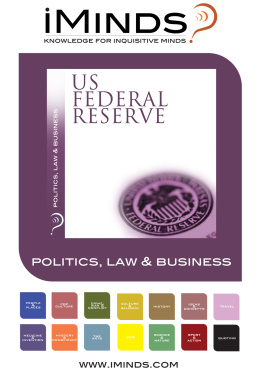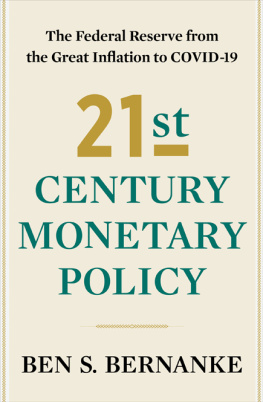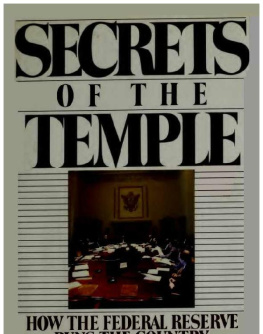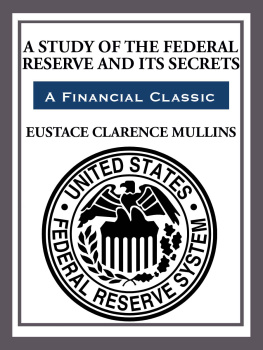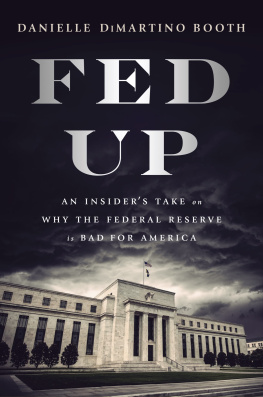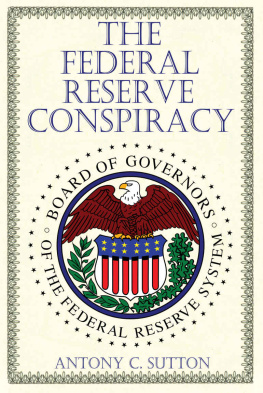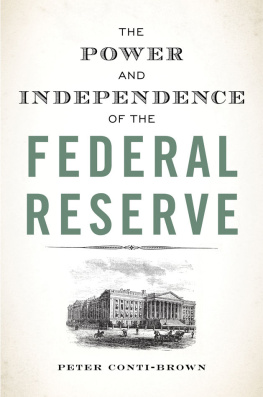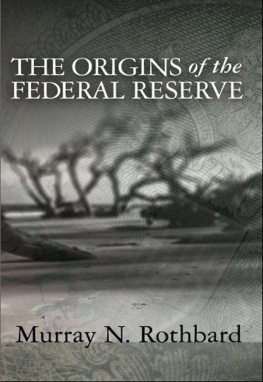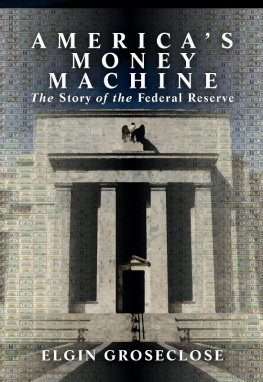A HISTORY OF THE FEDERAL RESERVE
allan h. meltzer
a history of the
Federal Reserve
volume 1, 19131951
with a foreword by alan greenspan
the university of chicago press chicago and london
A llan H. Meltzer is the Allan H. Meltzer University Professor of Political Economy at Carnegie Mellon University and Visiting Scholar at the American Enterprise Institute, Washington, D.C. He is the author or coauthor of several books, most recently Money, Credit, and Policy, and served on the Presidents Council of Economic Advisers from 1988 to 1989.
The University of Chicago Press, Chicago 60637
The University of Chicago Press, Ltd., London
2003 by The University of Chicago
All rights reserved. Published 2003
Printed in the United States of America
12 11 10 09 08 07 06 05 04 03 1 2 3 4 5
ISBN: 0-226-51999-6 (cloth)
Library of Congress Cataloging-in-Publication Data
Meltzer, Allan H.
A history of the Federal Reserve / Allan H. Meltzer.
p. cm.
Includes bibliographical references and index.
Contents: v. 1. 19131951
ISBN 0-226-51999-6 (v. 1 : alk. paper)
1. Federal Reserve banks. 2. Board of Governors of the Federal Reserve System (U.S.)
I. Title
HG2563 .M383 2003
332.1' 1' 0973dc21
2002072007
The paper used in this publication meets the minimum requirements of the American National Standard for Information SciencesPermanence of Paper for Printed Library Materials, ANSI Z39.48-1992.
To Marilyn
foreword
Allan Meltzer, who undertakes projects that to most appear daunting, has delved deeply into the history of the Federal Reserve System, with a result that will add substantially to the discourse on the institutions role and development. He has reviewed the records of policy discussion at an extraordinary level of detail, and his analysis illuminates the contributions of the many fascinating individuals who shaped the Federal Reserve System we know today.
Beginning with a history of developments that underlay the initiation of Americas most recent experiment in central banking, Meltzer carries the reader through the challenges of a developing institution faced with enormous economic upheaval, aptly describing the strong personalities that influenced both policy and culture in the System.
His work explores the Federal Reserves inadequate response to the Great Depression and the struggle for dominance in the System. According to Meltzer, the struggle did not wholly preclude agreement in times of crisis; nevertheless, the well-known exhortations of Bagehot and Thornton that a central bank must act to counter a banking crisis and currency drain without regard for the gold reserve were ignored. In Meltzers view, the Systems adherence to the real bills doctrine, combined with a belief that the purging of speculative excess was necessary to set the stage for price stability, led to the failure of monetary policy to lessen the decline.
The book describes in detail the roles played by Federal Reserve bank presidents, which have evolved substantially over the years, as has the relationship between the reserve banks and the Board of Governors. The early dominance of the Federal Reserve System by Benjamin Strong, governor of the Federal Reserve Bank of New York, is an interesting episode. Strong was credited more than anyone else with recognizing in the years after World War I the financial and economic impact of reserve bank purchases and sales of Treasury debt and the need to coordinate those transactions. Meltzer depicts Governor Strongs opposition to a 192627 congressional proposal to amend the Federal Reserve Act to make price stability an explicit policy goal. He describes Governor Strongs concern that the bill offered by another Mr. StrongKansas Republican congressman James A. Strongwould be interpreted to mandate the stability of individual prices, particularly of agricultural products. In a clear example of his willingness to take sides, Meltzer says here that had a mandate for price stability been approved, the Fed could not have permitted the Great Depression of 192933 or the Great Inflation of 196580.
Ultimately the Banking Act of 1935, largely adopting reforms proposed by Marriner Eccles, resulted with some subsequent refinement in the structure of the Federal Open Market Committee. Eccles had sought an FOMC wholly controlled by the Board rather than so-called private interests. However, Senator Carter Glass of Virginia and others were leery of monetary policy dominated by what they saw as political interests. The compromise that emerged mandated that monetary policy be conducted with a broader vision than if either Eccles or Glass had prevailed.
Meltzers book covers with the same methodical illumination the events of more recent years, completing a work both stimulating and provocative. Readers will have substantial material for continued reflection and discussion.
Allan Meltzer has spent a lifetime inquiring into monetary economics, and he calls the evidence as he sees it. His combination of interests and experience makes him most qualified for this undertaking, and he brings to the endeavor a closeness of analysis that makes his conclusions both fascinating and valuable. Those of us who enjoy the debates he inspires will find much satisfaction in this book, as in his other important works.
Alan Greenspan
preface
The project that eventually became this book began in 196364, when the late Congressman Wright Patman asked me to extend a study I had done for the Joint Economic Committee. That study described operations in the dealer market for government securitiesthe market in which the Federal Reserve conducts its open-market operations. When I explained that the problems that concerned him arose at the Federal Reserve and not in the market, he asked me to undertake a study of the Federal Reserve.
My former teacher Karl Brunner, later my friend and lifetime collaborator, joined the project. Together we wrote a lengthy study of Federal Reserve operations, emphasizing their use of free reserves as a target and indicator of the thrust of policy. We showed that these procedures were faultythat the Federal Reserves analysis did not go beyond the money market to the broader objectives required by an efficient and effective monetary policy. We proposed an alternative framework.
The late Harry G. Johnson proposed to the University of Chicago Press that it republish the study. The original studies were hastily written to meet congressional deadlines. I started to rewrite several sections but decided instead to extend the analysis. One set of questions in particular warranted attention: Why had the Federal Reserve acted as it did? Why had it failed to respond to the Great Depression or the deep recession of 193738? Why was monetary policy often pro-cyclical?
This book tries to answer those questions. At various times in the late 1960s and early 1970s, I began to revise the manuscript to complete the history. Karl Brunner always expressed interest, but he never devoted any time to working on the manuscript or commenting on what I had written.
In the fall of 1994 I returned to work on this book while on leave from Carnegie Mellon at Harvard University and the National Bureau of Economic Research. My thanks to Martin Feldstein for the hospitality and pleasant working conditions at the Bureau.
In the nearly thirty years since I first started on this project, both the Federal Reserve and my ideas have changed. Some of the ideas in the original study remain, but much of this material is new.
The most important influence on my thinking and conclusions has come from reading the minutes, correspondence, and other internal documents developed at the time. Records for the Federal Reserve Board and the Board of Governors became available as a result of the Freedom of Information Act in the 1970s. The cooperation of Chairman Alan Greenspan, the secretary of the Federal Open Market Committee, Normand Bernard, and the library staff went far beyond legal requirements. I am indebted to them, to Susan Vincent and Kathy Tunis at the Board of Governors library, and to Elizabeth Jones of the Boards staff for their helpful assistance.
Next page

